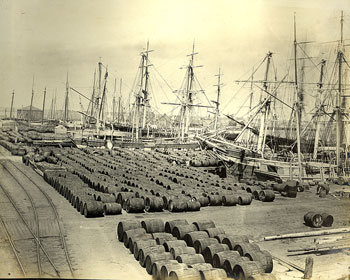- Page:
- 1 /
- 2
"We Diffuse the Light"
Long before Laura Jernegan and her family ever climbed aboard the bark Roman, hundreds of people had worked to make their whaling voyage a success. New Bedford was a whole city devoted to whaling, building and repairing ships, gathering supplies necessary for the long, dangerous trips, and processing the oil and whalebone that were brought back. So important was whaling to New Bedford, that the city seal boasted "Lucen Diffundo" or "We Diffuse Light" in Latin. Men were hired to fill shipboard jobs. Live animals were brought into the city and loaded onto ships. Iron tools were hammered into shape. Over the waterfront hung the stench of whale oil and the promise of profits.
As a girl from a small town, Laura might have been impressed by New Bedford's distinctive sights, sounds, and smells. A boy who grew up in town recalled that, walking down the main street toward the harbor, one "saw 'etched on the sky' a forest of 'masts and yards of ships.'" As one descended the hill, the buildings became smaller and older, blocks shortened, and "the beach-cobble paving, became more worn and irregular." Each block had its own scent associated with the businesses along its length, ranging from coffee and molasses to tobacco and fresh fruits and vegetables.

Martha's Vineyard Museum